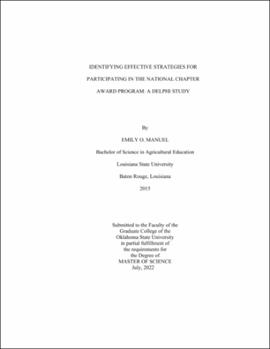| dc.contributor.advisor | Ramsey, Jon W. | |
| dc.contributor.author | Manuel, Emily O. | |
| dc.date.accessioned | 2023-04-12T19:38:34Z | |
| dc.date.available | 2023-04-12T19:38:34Z | |
| dc.date.issued | 2022-07 | |
| dc.identifier.uri | https://hdl.handle.net/11244/337369 | |
| dc.description.abstract | This study utilized a modified Delphi technique to gather consensus through the use of an expert panel. Email was used to distribute Qualtrics links for participant recruitment and three rounds of questions. Round One collected personal and professional characteristic questions and asked one open-ended question. Strategies and themes were discerned through qualitative content analysis in Round One. A summated rating scale was utilized to reach consensus of agreement in the second and third rounds. This study yielded 37 strategies that could be utilized by FFA chapters to reach a three-star ranking in the NCA Program. Strategies were categorized into four themes: (1) Planning & Resources, (2) Implementing Activities, (3) Application Writing, and (4) Reflecting. The Planning and Resources theme revealed teachers are focused on providing service activities that impact the local community which aligns with the FFA mission and purpose i.e., provide opportunities for students to become productive citizens. Some teachers did not fully utilize a Program of Activities (POA) and others did not use the NCA as a template for the POA. Most strategies in the Implementing Activities theme revealed student involvement and engagement were crucial to having successful activities. Application Writing strategies such as writing action plans and having officers complete the application were not seen as integral strategies by all teachers. Reflecting was the least cited theme with only four accepted strategies. These strategies have the potential to serve as a resource for FFA chapters competing in the NCA program. The themes suggested a potential approach to completing the NCA application that reflects the experiential nature of the comprehensive model of school-based agricultural education and supports the National FFA Organization mission, vision, and motto. The themes identified strategies that could align with the experiential learning process. Items that national leaders would point to as critical to the NCA application process were not seen as strategies for completing the application by panelists. The responses that failed to meet consensus reflected missed learning opportunities that could lead to reflection and active experimentation in a real-world environment which trends away from the mission and vision of the National FFA Organization. | |
| dc.format | application/pdf | |
| dc.language | en_US | |
| dc.rights | Copyright is held by the author who has granted the Oklahoma State University Library the non-exclusive right to share this material in its institutional repository. Contact Digital Library Services at lib-dls@okstate.edu or 405-744-9161 for the permission policy on the use, reproduction or distribution of this material. | |
| dc.title | Identifying effective strategies for participating in the National Chapter Award Program: A Delphi study | |
| dc.contributor.committeeMember | Terry, Robert, Jr. | |
| dc.contributor.committeeMember | Smith, Nathan | |
| osu.filename | Manuel_okstate_0664M_17863.pdf | |
| osu.accesstype | Open Access | |
| dc.type.genre | Thesis | |
| dc.type.material | Text | |
| dc.subject.keywords | agricultural education | |
| dc.subject.keywords | Delphi | |
| dc.subject.keywords | FFA | |
| dc.subject.keywords | National Chapter Award | |
| dc.subject.keywords | program of activities | |
| thesis.degree.discipline | Agricultural Education and Leadership | |
| thesis.degree.grantor | Oklahoma State University | |
